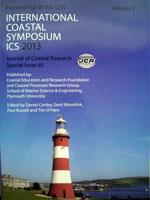Thompson, C.E.L., Kassem, H. and Williams, J., 2013. BARDEX II: Nearshore sediment resuspension and bed morphology.
Sediment resuspension in the region outside the surf zone is known to contribute to the morphological response of barrier beaches to wave forcing, such as onshore bar migration processes. However, few measurements in this region exist, limiting our ability to quantify its contribution. These processes are complicated by the presence of bedforms in the nearshore, which alter the sand transport processes while modifying bed roughness in a complex feedback mechanism. The Hydralab IV funded BARDEX II experiments, which took place in the Delta Flume in 2012, were used to provide measurements of these processes in the nearshore of a sandy barrier beach (D50 = 0.42mm) under a range of wave conditions (Hs = 0.3 - 0.8 m; Tp = 4 – 12 s) and water levels, through deployment of a suite of acoustic instruments measuring flow velocity, near-bed turbulence, sediment resuspension profiles and bed morphology in cross-section and plan view. Initial findings indicate that sediment suspension in the nearshore appears to be controlled by a combination of near-bed turbulent bursting processes which results in near-instantaneous low concentration suspensions restricted to the bottom boundary layer, and vortex shedding from bedforms which results in higher concentration suspensions which are larger in scale than vertical eddy sizes, and perpetuate outside of the bottom boundary layer.





